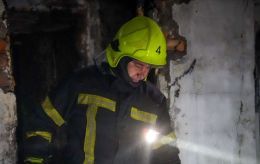Closed schools and more. Israel imposes restrictions due to Iranian attack threat
 Israel imposes restrictions due to Iranian attack threat (photo: Getty Images)
Israel imposes restrictions due to Iranian attack threat (photo: Getty Images)
In anticipation of an Iranian attack, Israel imposes a number of restrictions to ensure the safety of the population, says Israeli Defense Forces spokesperson Daniel Hagari.
As Hagar announced, Israel has decided to ban all educational activities throughout the country, as well as limit mass gatherings to 1,000 people. In some areas, such as near the border with Gaza and Lebanon, stricter restrictions are already in place.
Currently, most educational institutions in Israel are closed due to the Passover holiday, but, according to an army spokesperson, restrictions also apply to school tours and camps.
The restrictions will be in effect throughout Israel until 23:00 on Monday, April 15.
All this time, Hagari emphasized, Israel's air defense will be "on alert" and "dozens of aircraft will be in the sky."
Iran may not strike civilians
At the same time, Israel's Channel 12 reported that, according to Israeli security services, Iran will try to strike military rather than civilian targets.
On the evening of April 13, according to the Times of Israel, Israeli Prime Minister Benjamin Netanyahu went to the military headquarters of the Israeli Defense Forces to hold consultations with senior military leaders about the threat from Iran.
At the same time, Defense Minister Yoav Gallant held an assessment with the Chief of Staff of the Israeli Defense Forces and other defense officials.
Aggravation between Iran and Israel
On April 1, a missile attack on the Syrian capital completely destroyed the building of the Iranian consulate. At least seven Iranians were killed, including two generals.
Iran accused Israel of the attack and promised a "tough" response. Israel, for its part, warned Iran that in the event of an attack from Iranian territory, it would retaliate.
Western media claim that Iran is preparing for an attack and that it could happen in the coming days. According to CNN, the United States has recorded the movement of weapons in Iran.
Read more about the causes of the conflict in RBC-Ukraine's article.

